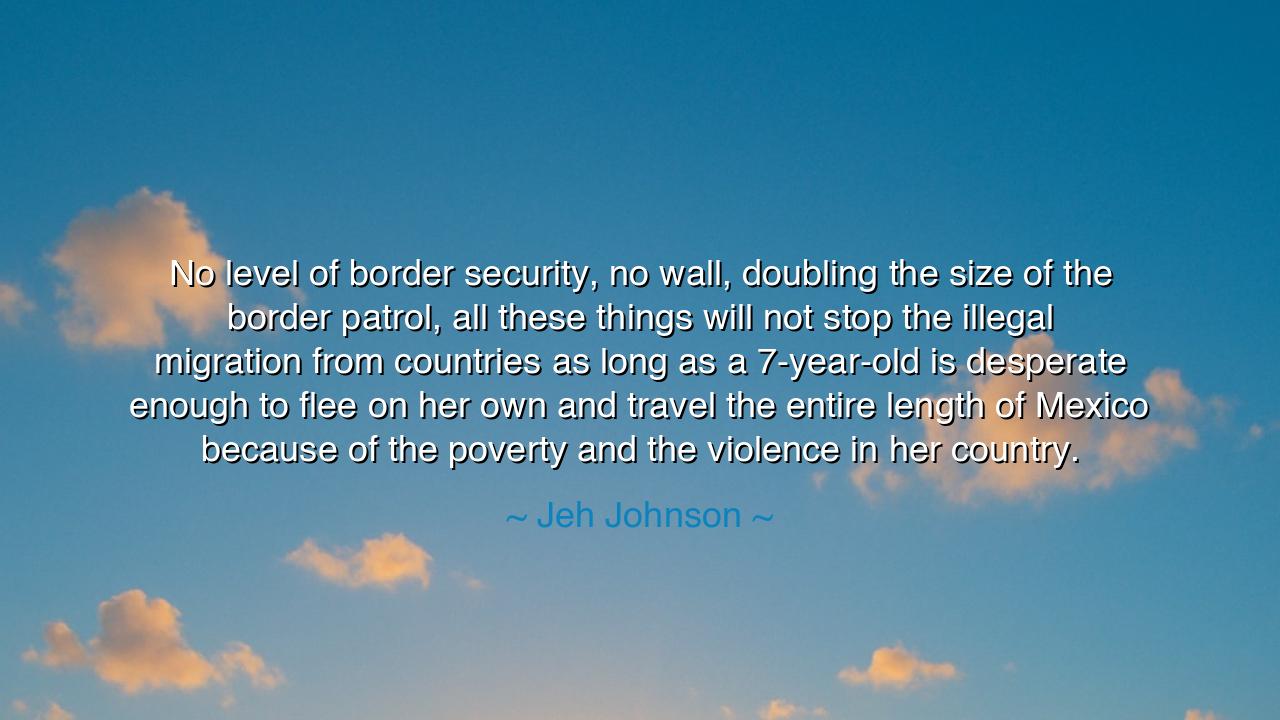
No level of border security, no wall, doubling the size of the
No level of border security, no wall, doubling the size of the border patrol, all these things will not stop the illegal migration from countries as long as a 7-year-old is desperate enough to flee on her own and travel the entire length of Mexico because of the poverty and the violence in her country.






Hear the words of Jeh Johnson, who proclaimed: “No level of border security, no wall, doubling the size of the border patrol, all these things will not stop the illegal migration from countries as long as a 7-year-old is desperate enough to flee on her own and travel the entire length of Mexico because of the poverty and the violence in her country.” At first, this is the language of politics and policy. But when heard with the ear of the soul, it resounds as prophecy and lament. For Johnson is not speaking of barriers, nor of armies, but of the indomitable power of human desperation—and the futility of walls when hearts are crushed by suffering.
The image of a 7-year-old child, alone on the road, fleeing hunger and terror, is more powerful than any battalion. It reminds us that behind every statistic is a face, and behind every migration is a story of unbearable loss. That such a small one, barely able to write her own name, would dare the length of a continent, speaks to the extremity of despair. No fortress can hold back one whose only weapon is necessity, for necessity drives more fiercely than armies and is braver than kings.
Johnson names border security and the wall, yet strips them of their illusion. They are iron, they are stone, they are men with weapons—but against a child’s hunger, they are shadows. For walls can be scaled, guards can be evaded, policies can be bent, but poverty and violence—these are storms that drive people forth no matter the cost. Until these storms are calmed, the tide of migration will flow, not because of ambition or greed, but because survival itself cries out.
History confirms this truth. Consider the Great Migration of Irish families during the famine of the 19th century. No laws, no borders, no barriers could prevent the starving from leaving their homeland in search of bread. Ships overflowed, thousands perished on the journey, yet still they came. It was not adventure, but desperation, that carried them across the ocean. And in their suffering, they reshaped nations, leaving a legacy that walls could not erase.
So too with the Jewish refugees fleeing Europe before and during the Holocaust. Many nations turned them away, their walls high and their quotas rigid. Yet still they sought escape, because the fires of persecution burned hotter than any border. In those years, the lesson became clear: laws that ignore human desperation crumble before history’s judgment. Johnson’s words carry that same reminder: policy without compassion is doomed to fail, for it misunderstands the heart of human will.
The deeper meaning of this quote is this: migration is not stopped by force, but by justice. If we would halt the desperate child’s journey, we must cure the root—the poverty that empties bellies, the violence that turns homes into graves. To build walls without healing causes is to treat the smoke but ignore the fire. The little girl on the road does not move because she wishes to defy borders; she moves because she wishes to live.
The lesson for us is clear: when you see migrants, refugees, exiles, do not see lawbreakers first—see human beings driven by forces greater than themselves. Practically, this means supporting not only humanitarian aid, but also policies that confront the root causes of migration: poverty, violence, and instability. It means remembering that compassion is not weakness, but wisdom, for it strikes at the cause rather than the symptom.
Therefore, children of tomorrow, remember the wisdom of Jeh Johnson: walls and armies cannot stop those whom hunger drives and terror pursues. If you wish to end the journey of the desperate child, do not raise higher stones—heal the wound of her homeland. For true security is not in barriers, but in justice; not in patrols, but in peace. Until then, the small and the weak will walk across deserts and rivers, and even the mightiest wall will tremble before the footsteps of a child who only longs to live.






AAdministratorAdministrator
Welcome, honored guests. Please leave a comment, we will respond soon